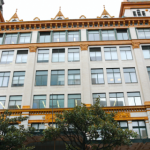Judicial Appointments: Politics or Merit?

The appointment of Tim Carmody to the position of Queensland’s Chief Justice on 8 July 2014, was one of the most controversial decisions in Australia’s recent legal history. Carmody had previously held the position of Chief Magistrate of the Local Court, and this was the first time in history a person in his position had been promoted directly to the Chief Justice of the Supreme Court.
A promotion like this should be based on relevant experience and demonstrated ability, and might be expected to go to the most senior Supreme Court Justice. And what’s more, Carmody had held the position of Chief Local Court Magistrate for a mere nine months.
The appointment was criticised because of Cormody’s close alignment with the former Queensland Newman government. During his time as Chief Magistrate, Carmody was a strong supporter of the state government’s controversial “anti-bikie laws” and went so far as to suggest other magistrates refrain from granting bail to members of motorcycle clubs.
Judicial appointments in Queensland
In Queensland, magistrates are appointed by the Governor-in-Council. However, the Governor must take recommendations from the Minister of Justice. At the time of Carmody’s appointment, the state’s Attorney-General Jarrod Bleijie was Minister of Justice. And questions about Carmody and Bleijie’s relationship were repeatedly raised.
Carmody resigned from his position on 1 July 2015, amidst criticism of his experience and ability, his stubborn refusal to take on certain types of work (including putting attendance at functions ahead of legal work), a lack of support from fellow judges and reports of low morale within the fraternity.
The fiasco led to suggestions that an independent judicial commission should be established. The commission would comprise of members of the community with the responsibility of appointing judges, which would leave formal politics out of the equation.
The selection process in NSW
But is there a need for an independent body in NSW?
Well, you might think so, given the final decision is left to a politician, the NSW attorney-general, currently Gabrielle Upton.
The selection process is outlined on the NSW Department of Justice website. A panel reviews expressions of interest and nominations, then creates a shortlist and interviews candidates to determine their suitability. The attorney-general is then given a report separating candidates into categories of ‘unsuitable’, ‘suitable’ and ‘highly suitable’.
The attorney-general then decides which one of those candidates will be appointed. And when a decision like this is being made by a politician, it is hard to see how it could not be politically motivated.
NSW magistrates
Take the case of Jacqueline Trad’s appointment as a magistrate in February 2006. She was appointed by then NSW attorney-general Bob Debus, just two months after being admitted as a solicitor. Ms Trad’s appointment was contentious because under Section 13 of the Local Court Act, a lawyer must have been practising for at least five years before qualifying for appointment as a magistrate.
As it turned out, Trad had been Debus’ ministerial adviser since 1999. Debus argued that Trad “got her actual legal qualifications the hard way,” as she’d been an adviser to Chief Magistrate and worked as a weekend bail registrar. But given her lack of experience as a lawyer, it is hard to conclude there was not some degree of political influence.
And in 2012, then NSW attorney-general Greg Smith was criticised for his appointment of Michael O’Brien to the position of magistrate. Mr O’Brien was the president of Mr Smith’s local Liberal Party branch with an office one floor above Mr Smith’s. Mr O’Brien had Mr Smith’s backing throughout his position as branch president.
Mr Smith refused to comment on whether he had exempted himself from cabinet discussions on the appointment.
A flawed system at every level
Chris Merritt, writing in the Australian on 7 July, 2007, described Australia’s system of judicial appointments as “one of the last great bastions of unregulated political patronage.” And this goes to the highest level.
He highlighted the fact that when the federal government makes an appointment to the High Court, they must consult the states but are not required to take their advice.
There is an argument that the current system is also contributing to the racial divide in the Australian judiciary.
The NSW selection panel
Take the NSW selection panel, which is comprised of the relevant head of the jurisdiction (ie chief magistrate, judge or justice), who are all Anglo Australian males, the Secretary of the Department of Justice, a member of the legal profession and a prominent member of the community.
The Chief Magistrate of the Local Court is Judge Graeme Henson. The Chief Judge of the District Court is Derek Price, and the Chief Justice of the Supreme Court is Tom Bathurst. The Secretary of the NSW Department of Justice, who also sits on the panel, is Andrew Cappie-Wood.
So could the ethnic background of those in power be influencing appointments?
As Sydney Criminal Lawyers® suggested last week, it’s hard to tell because the Judicial Commission of NSW does not keep records of the ethnic backgrounds of judicial officials in the state, and the Law Society and Bar Associations similarly have no records of the ethnic backgrounds or religion of solicitors and barristers,
The racial imbalance in the NSW judiciary
We contacted the mentioned three tiers of the NSW court system, and were told they don’t record such information either. However, they all have lists of current judicial officers on their websites.
So we decided to take a look at the names on these lists, as well as search for photos, make direct and internet inquiries, and use our own knowledge. Of course, this is not an exact science. But without any official accounting for these figures, this is all we have left.
Amongst the 263 judicial officials listed on the sites, it appears that 83 percent have Anglo Australian surnames, while about 13 percent have western European names.
Amongst the names on the list of justices of the NSW Supreme Court, all appear to have Anglo Australian and western European surnames.
The list of judges at the NSW District Court reveals one judge of Greek background, along with Judge Peter Zahra, who is Maltese, and Judge Dina Yehia, who is of Greek and Egyptian background and was born in Egypt.
While among local court magistrates in NSW, there appear to be five magistrates of Eastern European origin and only one with an East Asian background, Magistrate Derek Lee.
There appear to be no judicial officials in the state with a background from the Indian sub-continent (India, Pakistan, Sri Lanka, Bangladesh etc). Only one each from East Asian (China, Korea, Japan etc) and ‘Middle Eastern’ (Lebanon, Iran, Iraq, Syria, Jordan, Turkey, the north African nation of Egypt etc) backgrounds. A handful from Christian, Eastern European nations (Greece, Italy, Poland etc), and an internet search confirms there are no Indigenous Australians serving as NSW judicial officials at present.
A need for multicultural representation
The judiciary is meant to represent society as a whole.
But these figures suggest it is not representative of our multicultural society. And while this disparity continues, it is hard to see how groups within the Australian community who are not represented can have confidence in the impartiality of the justice system.
While an independent body might be needed to address political influence when appointments of judicial officials are made, what might be of greater urgency is an affirmative action program – as they have in the US and the UK – to address the racial imbalance in the NSW judiciary.








